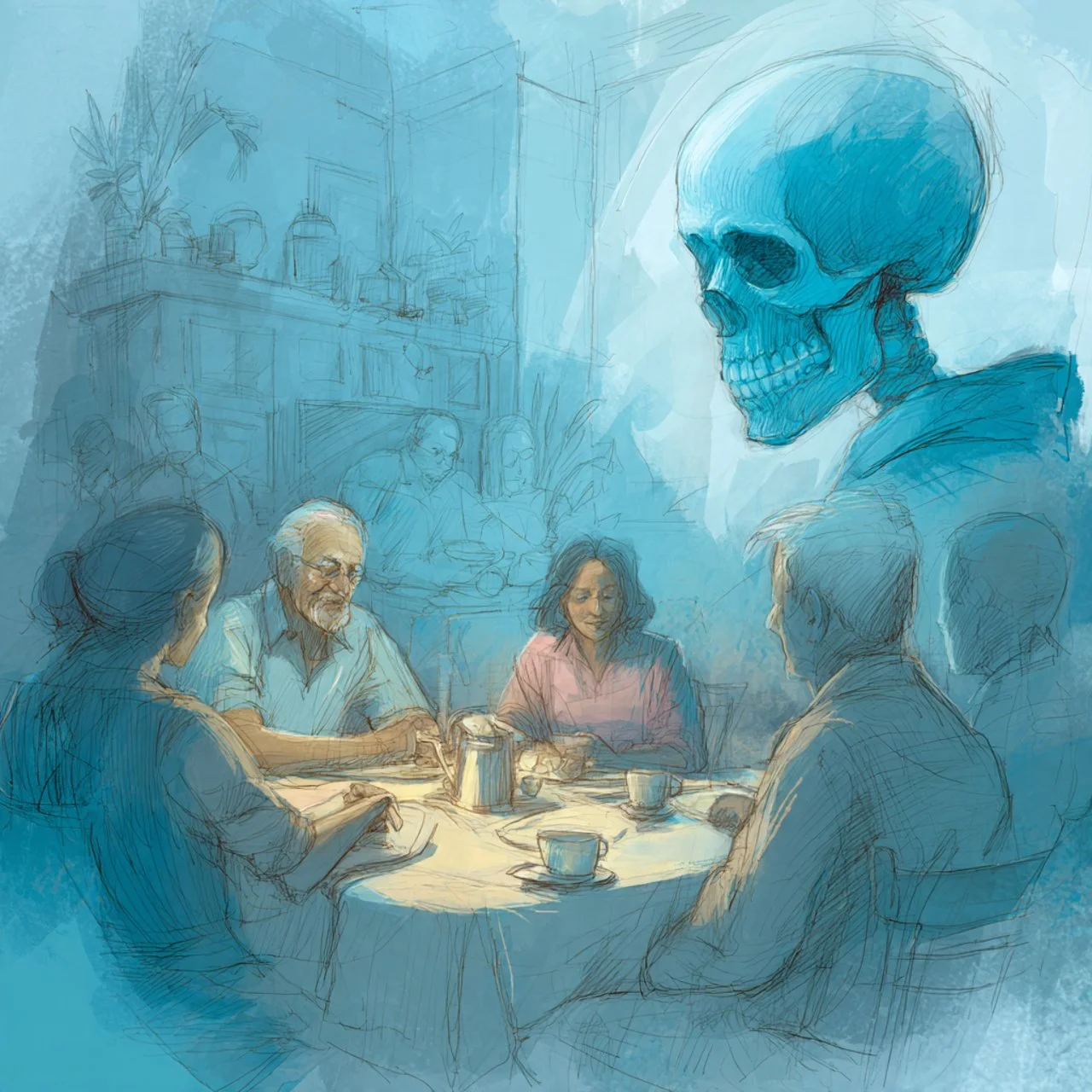We’re all going to die. But nobody wants to talk about it.
That’s not really true. Americans, for example, seem to resist discussing mortality as a culture.
But me? I’ve loved talking about death for as long as I can remember. I’ve discovered, however, that not everyone is as comfortable as I am addressing the topic.
And yet, there is a deep need for safe places to share stories, ask questions, and express concerns. Where are these safe places?
Enter Death Café.
Death Café is a global movement that began in London in 2011, founded by Jon Underwood and inspired by the ideas of Swiss sociologist Bernard Crettaz, who had hosted “Cafés Mortels” to encourage open conversations about death. The concept is simple: people gather, often in informal settings like cafés, community centers, or online, to discuss death and dying over tea and cake. It is designed to be a collective (whole-group) conversation. Death Café isn’t therapy, but community.
Traditionally, a Death Café is not facilitated in the typical sense (no agenda, no teaching, no guided discussion), but a space where people can talk openly about death, wherever the conversation naturally goes. That said, the host’s role is still crucial, not to lead, but to hold the space to:
· Welcome everyone, introduce the concept and ground rules (confidentiality, respect, no advice-giving or proselytizing).
· Help the conversation flow if it stalls.
· Ensure everyone feels safe and heard.
Note: People should be sitting around a table or in a circle for the best results.
Core Ground Rules/Guidelines:
1. Confidentiality: “What’s shared here stays here.” People can talk about what they learned or felt, but not who said what.
2. Listening with presence: “We listen to understand, not to respond.” Encourage silence and deep listening. Sometimes the most supportive response is simply presence.
3. No advice, fixing, or rescuing: “We’re not here to solve or comfort away anyone’s pain, only to witness it.” You can remind people that grief, fear, and wonder don’t need solutions. They need space.
4. Speak from the ‘I’: “Speak from your own experience, not in generalities or theories.” This keeps the tone intimate and authentic.
5. Respect all perspectives: “Everyone’s beliefs, stories, and experiences are welcome, even if they differ from our own.” No need to agree or debate.
6. Equal voice, gentle timing: “Let’s give everyone who wants to speak the chance to do so.” You can softly intervene if someone’s taking a lot of airtime by saying: “Let’s pause here so others can share as well.”
7. Tea and cake spirit: This one’s part of the Death Café ethos. It’s about being human together, even amid heavy topics. This is a place for warmth, curiosity, and connection, not therapy or judgment.
Handling When People Respond to Others’ Grief:
· This will definitely happen, and how you respond sets the tone. If someone starts offering advice or trying to fix, you can gently interject with warmth: “That’s a really kind instinct, wanting to help. Let’s just remember we’re here mainly to listen and share, rather than to give advice.”
Or…
· “It’s beautiful to want to support each other. Maybe let’s just hold space for what’s been shared, without needing to make it better.”
You’re not shaming them, just guiding them back to the ground rules.
If someone gets emotional or cries:
· Let it be. Silence and tissues are enough.
· You can simply say: “Take your time. We’re with you.”
· Then move gently on when it feels right.
If things get very intense or the energy dips:
· You can bring a soft reset by saying, “Let’s all take a deep breath together.”
· Or… “Would anyone like to share something that feels alive for them right now, maybe a reflection or question that’s come up?”
If you’ve never moderated a Death Café and are not sure where to begin, you could share a personal story, experience, or thought to model openness and vulnerability in a grounded way. can suggest a few questions people sometimes reflect on, and remind them that there is no right or wrong way to share. Here are a few prompts:
· If you could know the exact day of your death, would you want to? Why or why not?
· Is there such a thing as a “good death”? What would that look like to you?
· What do you hope people will remember about you?
· Do you think our stories live on after us in the people we’ve touched?
· If there were no death, how would life be different? Would it lose something important?
· Do you believe we get to “meet again” with loved ones after death, or is the legacy they leave enough?
· If life is like a book, do you think the ending matters most, or the chapters along the way?
· What role does humor play in how we face mortality? Can laughter soften the fear of death?
· If you could imagine heaven or an afterlife, what might it look like?
A closing touch, you might want to end by gathering people back together for a short reflection:
· “What are you taking with you from today’s conversation?”
· “What felt meaningful or surprising?”
Then thank everyone for their courage and presence.


